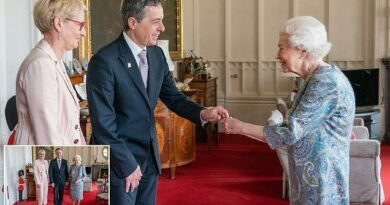Dozens of refugees released from Melbourne hotel and detention centre
Dozens of refugees detained for more than a year in Melbourne have been granted temporary bridging visas by the federal government.
Advocates and detainees are celebrating the development, but the federal government said the bridging visas were temporary measures and suggested the refugees would never be settled permanently in Australia.
Advocacy groups say 45 men were released from detention on Wednesday in Melbourne.Credit:Eddie Jim
Melbourne's Asylum Seeker Resource Centre and the Refugee Action Coalition confirmed that 26 medevac refugees were being released from the Park Hotel in Carlton on six-month bridging visas on Wednesday, while another 19 were also released from Melbourne Immigration Transit Accommodation (MITA) in Broadmeadows.
The ASRC said Australian Border Force officials took the 26 people from the Park Hotel to MITA to collect their property before they were to be released into the community with work rights and Medicare access for six months.
Another 34 people detained at the Carlton hotel have been told they also will receive visas and be released on Thursday, the ASRC said.
The ASRC's director of advocacy and campaigns, Jana Favero, called on the Morrison government to release the remaining 140 medical evacuees being held in mainland detention around the country.
“Doctors, lawyers, service providers and the wider community have called for the release of medevac refugees from harmful conditions in indefinite detention and today the federal government finally is listening to reason," she said.
A Bangladeshi refugee signals ‘joy’ to protestors outside a Carlton hotel.Credit:Chris Hopkins
The federal government said the bridging visas were temporary measures for refugees who were evacuated to mainland Australia from Nauru and Manus Island under the now-repealed medevac laws.
"The individuals residing in the alternative places of detention were brought to Australia temporarily for medical treatment," an Australian Border Force spokesperson said.
"They are encouraged to finalise their medical treatment so they can continue on their resettlement pathway to the United States, return to Nauru or PNG or return to their home country.
"A final departure bridging visa allows individuals to temporarily reside in the Australian community while they finalise their arrangements to leave Australia."
The refugees' freedom comes after a long campaign that culminated in angry protests at one of the former Melbourne detention locations, the Mantra Hotel in Preston, when hundreds of police responded to strong opposition outside the hotel's gates.
Refugee Mostafa “Moz” Azimitabar, who is housed at the Park Hotel in Swanston Street and watched some of the 26 detainees leave, said if one person could be freed, all 60 should be.
Refugee Mostafa Azimitabar at the Mantra Hotel in Preston.Credit:Luis Ascui
“I am very happy for these people who got their freedom,” Mr Azimitabar said. “But the way we’re all treated is very sad, very unfair.
“There is no fresh air, no windows, only glass. Instead of seeing a tree, or a view inside the city or a flower, we are watching a cement wall. It’s exactly like a coffin.”
For more than a year, 60 men were detained in rooms on the third floor at the Mantra after being evacuated from Manus Island to receive medical treatment under the medevac legislation.
Before their evacuation to Melbourne the men had been detained for up to seven years on Manus Island.
The men are suffering a range of conditions, most commonly depression and post-traumatic stress disorder.
Advocate groups said the options for those being released into the community were limited.
"Many of them have never received the medical treatment for the reasons they were transferred [to mainland Australia], and there are others have that have completed their treatment," said Refugee Action Coalition spokesman Ian Rintoul.
Refugee advocates wave to a van load of refugees leaving a detention centre in Broadmeadows on Wednesday.Credit:Eddie Jim
"They are recognised refugees so the idea that they can go back to a country where their lives are at risk or they have been persecuted is ridiculous."
Mr Rintoul also said some of the refugees in Australia had repeatedly been denied their requests to go back to Nauru or PNG.
"They have no passport, no travel documents to get back to Nauru or Manus even if they wanted to," he said.
The ASRC said there were many refugees who were already in Australia had been on
rolling bridging visas for up to eight years, and called for a "permanent resettlement solution".
The group said the US resettlement deal was due to expire in March, with 270 individuals provisionally approved to resettle to arrive in America between March and April.
The Australian government has so far declined to take up the New Zealand government’s long-standing offer to take the asylum-seekers from Manus Island and Nauru, where advocates say 272 people remain in off-shore detention.
Wednesday's developments followed the release of seven men who were released on bridging visas from the Mantra and MITA in Broadmeadows in December last year.
People protest outside the Park Hotel in December.Credit:Jason South
Mr Rintoul said while some refugees and asylum seekers who were approved for medical treatment prior to the repeal of the Medevac laws last December are still being held offshore, 18 were brought from Nauru to Australia for medical treatment on Tuesday.
Those 18 people are being held at Villawood detention centre in Sydney, he said.
Start your day informed
Our Morning Edition newsletter is a curated guide to the most important and interesting stories, analysis and insights. Sign up to The Sydney Morning Herald’s newsletter here, The Age’s here, Brisbane Times’ here, and WAtoday’s here.
Most Viewed in National
Source: Read Full Article






